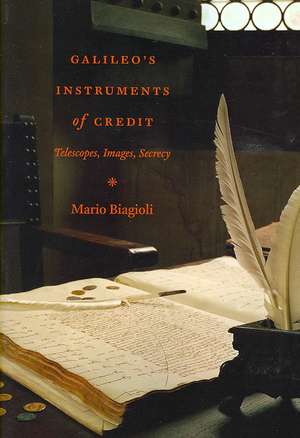Galileo's Instruments of Credit: Telescopes, Images, Secrecy
Autor Mario Biagiolien Limba Engleză Paperback – 21 iun 2007
In six short years, Galileo Galilei went from being a somewhat obscure mathematics professor running a student boarding house in Padua to a star in the court of Florence to the recipient of dangerous attention from the Inquisition for his support of Copernicanism. In that brief period, Galileo made a series of astronomical discoveries that reshaped the debate over the physical nature of the heavens: he deeply modified the practices and status of astronomy with the introduction of the telescope and pictorial evidence, proposed a radical reconfiguration of the relationship between theology and astronomy, and transformed himself from university mathematician into court philosopher.
Galileo's Instruments of Credit proposes radical new interpretations of several key episodes of Galileo's career, including his early telescopic discoveries of 1610, the dispute over sunspots, and the conflict with the Holy Office over the relationship between Copernicanism and Scripture. Galileo's tactics during this time shifted as rapidly as his circumstances, argues Mario Biagioli, and the pace of these changes forced him to respond swiftly to the opportunities and risks posed by unforeseen inventions, further discoveries, and the interventions of his opponents.
Focusing on the aspects of Galileo's scientific life that extend beyond the framework of court culture and patronage, Biagioli offers a revisionist account of the different systems of exchanges, communication, and credibility at work in various phases of Galileo's career. Galileo's Instruments of Credit will find grateful readers among scholars of science studies, historical epistemology, visual studies, Galilean science, and late Renaissance astronomy.
Galileo's Instruments of Credit proposes radical new interpretations of several key episodes of Galileo's career, including his early telescopic discoveries of 1610, the dispute over sunspots, and the conflict with the Holy Office over the relationship between Copernicanism and Scripture. Galileo's tactics during this time shifted as rapidly as his circumstances, argues Mario Biagioli, and the pace of these changes forced him to respond swiftly to the opportunities and risks posed by unforeseen inventions, further discoveries, and the interventions of his opponents.
Focusing on the aspects of Galileo's scientific life that extend beyond the framework of court culture and patronage, Biagioli offers a revisionist account of the different systems of exchanges, communication, and credibility at work in various phases of Galileo's career. Galileo's Instruments of Credit will find grateful readers among scholars of science studies, historical epistemology, visual studies, Galilean science, and late Renaissance astronomy.
Preț: 163.78 lei
Preț vechi: 200.48 lei
-18% Nou
Puncte Express: 246
Preț estimativ în valută:
31.34€ • 32.97$ • 26.15£
31.34€ • 32.97$ • 26.15£
Carte indisponibilă temporar
Doresc să fiu notificat când acest titlu va fi disponibil:
Se trimite...
Preluare comenzi: 021 569.72.76
Specificații
ISBN-13: 9780226045627
ISBN-10: 0226045625
Pagini: 316
Ilustrații: 16 halftones, 3 line drawings
Dimensiuni: 152 x 229 x 18 mm
Greutate: 0.43 kg
Editura: University of Chicago Press
Colecția University of Chicago Press
ISBN-10: 0226045625
Pagini: 316
Ilustrații: 16 halftones, 3 line drawings
Dimensiuni: 152 x 229 x 18 mm
Greutate: 0.43 kg
Editura: University of Chicago Press
Colecția University of Chicago Press
Notă biografică
Mario Biagioli is professor of history of science at Harvard University and the author of Galileo, Courtier: The Practice of Science in the Culture of Absolutism, also published by the University of Chicago Press.
Cuprins
List of Illustrations
Abbreviations
Introduction. From Brass Instruments to Textual Supplements
1. Financing the Aura: Distance and the Construction of Scientific Authority
2. Replication or Monopoly?: The Medicean Stars between Invention and Discovery
3. Between Risk and Credit: Picturing Objects in the Making
4. The Supplemental Economy of Galileo’s Book of Nature
Epilogue. Unintended Differences
Acknowledgments
References
Index
Abbreviations
Introduction. From Brass Instruments to Textual Supplements
1. Financing the Aura: Distance and the Construction of Scientific Authority
2. Replication or Monopoly?: The Medicean Stars between Invention and Discovery
3. Between Risk and Credit: Picturing Objects in the Making
4. The Supplemental Economy of Galileo’s Book of Nature
Epilogue. Unintended Differences
Acknowledgments
References
Index
